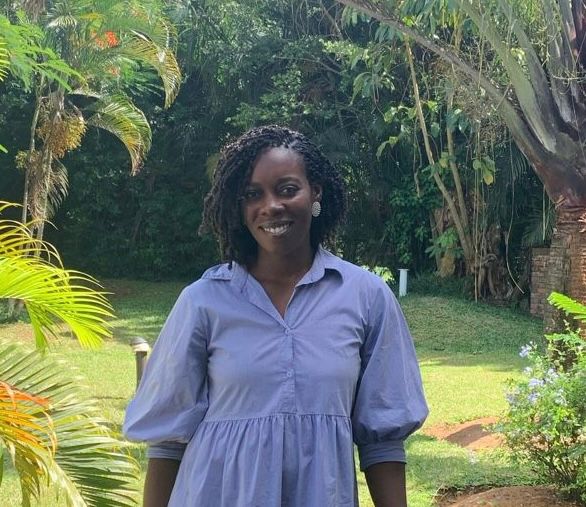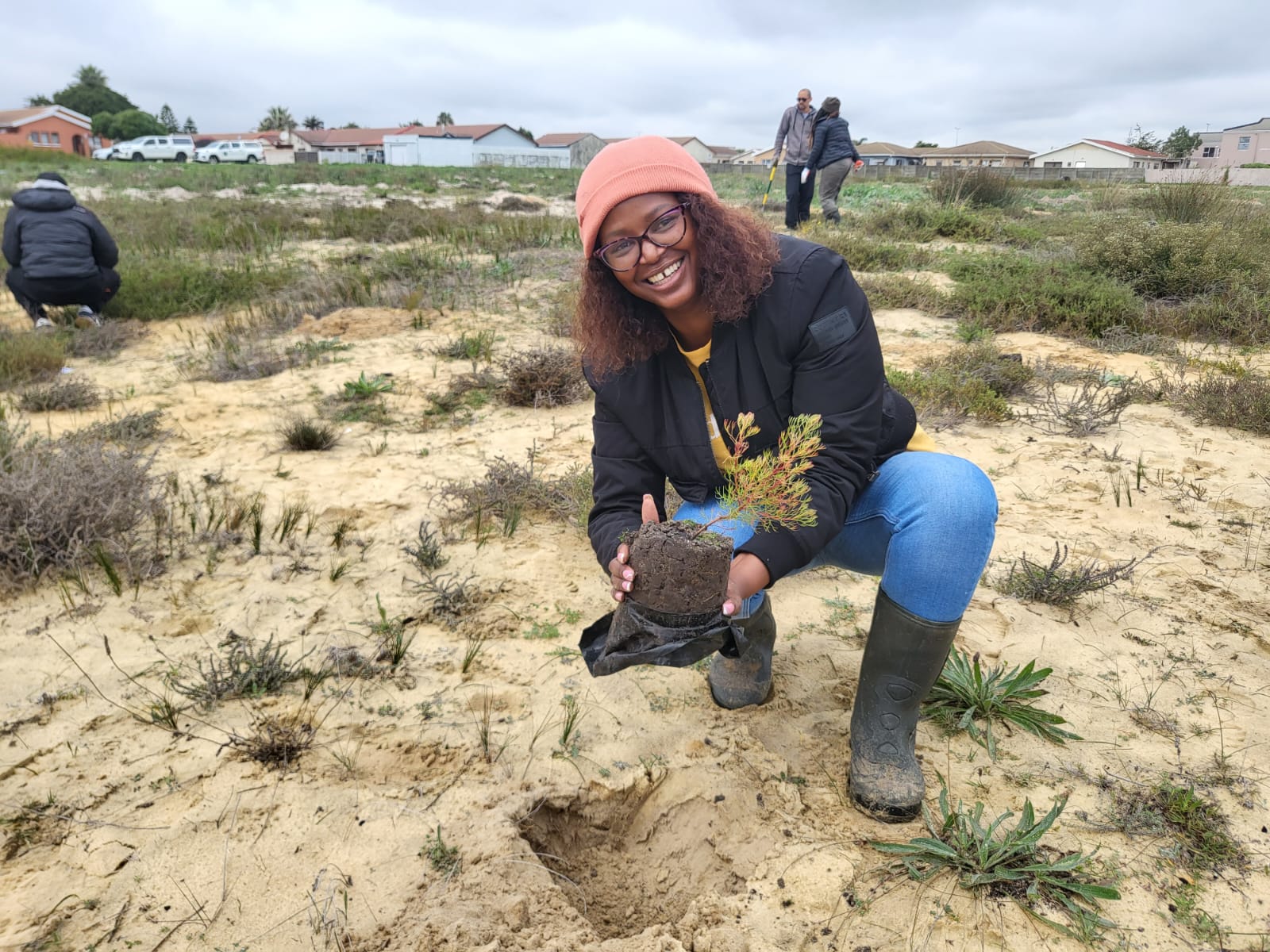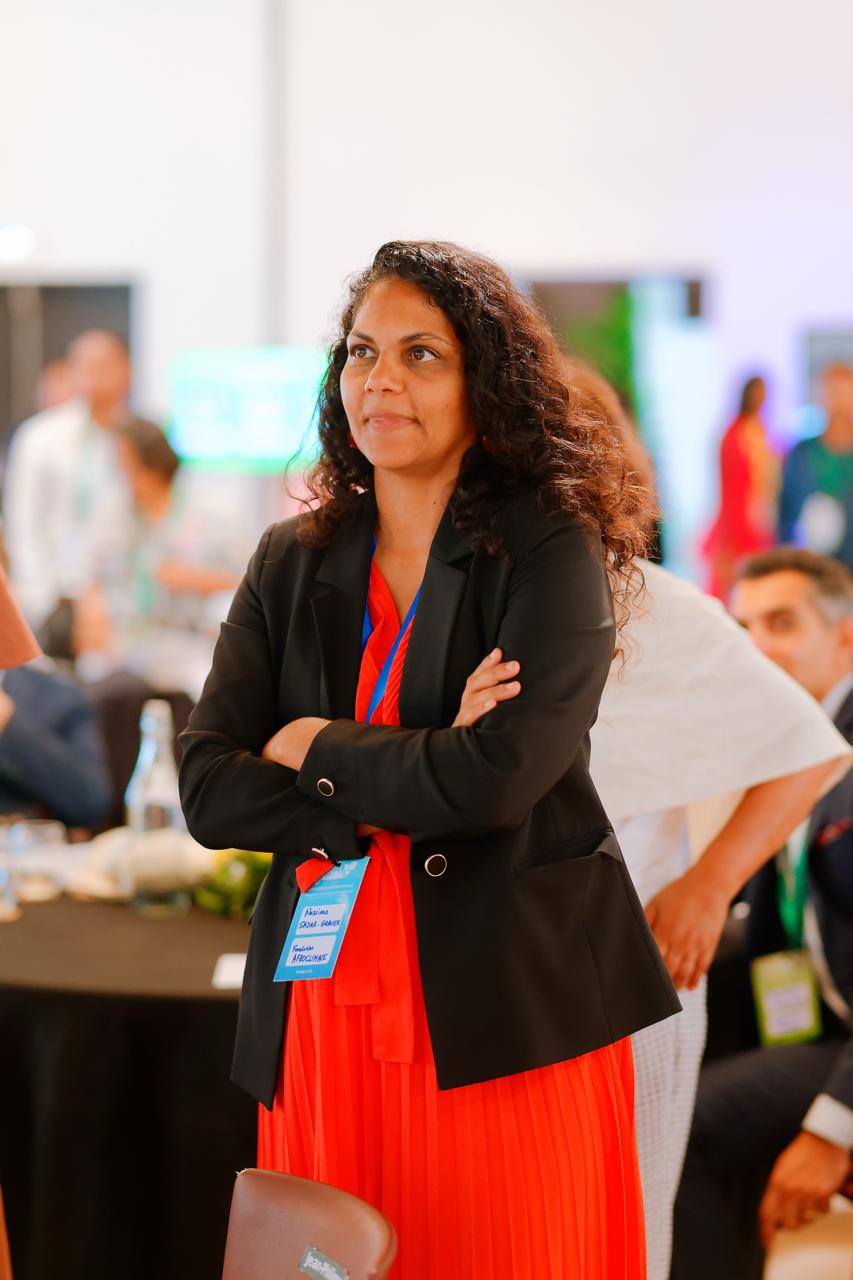This interview is part of a series profiling the stories of the 2024 WE Africa leadership programme fellows, African women in the environmental conservation sector who are showing up with a strong back, soft front, and wild heart.
***
Over the years, I've had the privilege of interviewing hundreds of people, and here's something I always find surprising: very few believe they actually have a story worth telling. Agatha Ogada is a case in point. She began our conversation on a hesitant tone:
“It's daunting and scary because, honestly, I don't think I have a story: What I would want people to know about me and why I'm doing this is just not clear to me. I'm just rolling with the punches.”
And then came the twist:
"I think I'm great. I just don't think I have a story."

It was such a beautifully human moment—raw, unsure, and completely captivating. So we started from the beginning: Agatha's childhood.
"I was this curious, self-assured kid who did what I wanted when I wanted," she says. "As the eldest of three girls, society expected me to be domesticated and ladylike. But that was the exact opposite of who I was."
Agatha grew up in a small rural town in Kenya called Molo, where her parents were veterinarians. As with most rural settings, there were specific unwritten rules about what it meant to be a boy or a girl. Girls were supposed to wear skirts and dresses. The trousers and shorts were reserved for boys. But Agatha despised wearing skirts and dresses. So she wore shorts and trousers. The other kids made up songs about her. How strange she was; dressing up like a boy.
"I just thought they had so much time on their hands to try to make fun of me. If it was meant to be an insult, it never landed," she says with a shrug. She'd patiently wait for their chants to die down and then join them in play because all she wanted to do was play.
And play she did.
Many of her days were spent doing "wild things". One of the craziest moments she remembers was climbing to the top of her family home's roof and jumping off it. "To this day, I have no idea how I didn't break my legs," she says.
Alongside the boys, she'd gather berries, hunt birds, and sometimes go after hares and dik-diks. Occasionally, they'd sneak into nearby farms, breaking off maize stalks to chew on, pretending it was sugarcane.
***
Agatha loved animals. So much so that she had a "pet" everything. A pet rat, a pet chicken, a pet goat, a pet cow, a pet bird—and even a pet spider. Although she admits to being terrified of spiders, she'd feel heartbroken if anyone killed one.
Being socially awkward—though, by her own admission, she's improved over time—she found it easier to connect with nature than with people.
"I think that came from having people around me who were always criticising me," she says.
Rebellious, aggressive, disruptive and overly confident. These are just some of the labels that Agatha picked up over the years. "In hindsight, I needed my choices to be practical and sensible to me, not dictated by what society thought I should do," she says.
My thought immediately goes to her parents. How did they receive her unconventional ways?
"My mum didn't understand me," Agatha says. "My great-grandmother had worked for missionaries during the colonial period, and because of this, she was very prim and proper, and that's precisely how she raised her children, who passed this on to their children and so on. Being part of this lineage, my mum tried to raise us the same way. But I just didn't get it, and she struggled with me.
My dad, on the other hand, grew up poor, which gave him a sense of freedom. I gravitated more toward his approach. He celebrated my individuality, and that is what I chose to focus on."
And it paid off.
Her unrestrained nature meant she didn't overthink things when choosing the career she wanted to pursue later on in life—she trusted her instincts. And they led her to Environmental Science.
"I remember when I chose it, the big question from people was, now what will you be? A forester? And who's going to employ you? As always, my dad was supportive. He said, "This is going to be an adventure. You'll decide your future—just do what makes you happy."
One of her lecturers offered her a piece of advice that stuck. He said that since conservation was still a relatively new field, the best way to figure out what direction to take was to volunteer at relevant organisations. And so Agatha volunteered—every holiday.
Her first stint was at the National Museums of Kenya's ornithology department.
"Watching birds and watching people bird-watching helped me understand people's interaction with nature. Because until then, I had separated the two," she says.
Her next opportunity was with Kenya Wildlife Service. She entered their offices and said, "I'm free and ready to work." She wasn't entirely sure what role she could play but was determined to make an impression. They asked her to come for an interview, and she found herself sitting across from the head of planning and environmental impact assessment. When asked what she could contribute, she was honest. "I work hard, I can put in long hours, and I can adapt quickly without taking up someone else's space." That was enough for them to give her a one-week trial.
That one week turned into a year.
She moved between departments, gaining experience and building trust. Soon, she got an opportunity to help develop management plans for marine parks and reserves. Her task? To collect a resource-based inventory. This meant going into the water and writing down what she observed. At first, the idea seemed absurd to her. "What does this mean? Just diving and seeing blue water and maybe a dolphin?" she wondered.
Still, she tried it, and although she could swim, the ocean was intimidating. She went in wearing a life jacket and a safety ring and insisted on being accompanied by a guide. In her mind, she was convinced she was going to die.
She didn't die. What she did do was discover wonders beneath the water that changed her perspective. Forever.
"It felt like I'd only been underwater for ten minutes. In reality, I'd been there for two hours," she says. "I realised that I'd found home."
Two days later, the East Africa Wildlife Society offered her a job as a Marine Project Officer. She quickly rose through the ranks to become the Marine Manager.
***
What surprised many people was how quickly Agatha established herself in the conservation world. It was uncommon for someone without connections to climb the ladder in a system that dictated that women had to "play the game"—whether by sleeping their way to the top or avoiding disagreement with male authority figures. Agatha rejected it. All of it. And she didn't hold back from speaking her mind.

Agatha came to be known as someone who was no-nonsense, fiercely competent, and unapologetically herself. Colleagues and peers described her as an iron lady who "knows her stuff”.
"I have very strong opinions, which can be intimidating, but it also allows for more conversation," she says.
Throughout her journey, Agatha has come to believe that the humility to learn is what truly shapes a person. "I call myself a perpetual student," she says. She also recognises that those who came before her likely paved the way, softening the challenges she has faced and making her pushback feel less overwhelming than it could have been.
But how did she really survive? Because being true to oneself can be punishing.
"I think it comes down to what I've believed since childhood: I can only control what's inside me and what I do. What others think of me is not my responsibility. I might not have accolades in the marine space, but I've earned a lot of respect for not conforming. I've been denied the privilege of speaking at big conferences because I'm not predictable. But people seek me out for my insights or to contribute to books."
She goes on, "Integrity is often tested when people want recognition, money or power. For me, it wasn't about any of that. When my work is done, I want to look back and say, 'That woman was... she was herself.’"
***
Seven years after working with East Africa Wildlife Society, Blue Ventures reached out to Agatha. Known for its impactful work in Indonesia and Madagascar, the organisation wanted her to establish an office in Kenya from the ground up.
"I've been with Blue Ventures for over six years now, and I have some exciting news," Agatha shares. "I've just been headhunted for a new role as Regional Director for Programs and Partnerships in Africa for Legado Initiative. It's a women-led organisation focused on conservation and community development. I did not know about this organisation; they reached out to me, I had an interview, and two hours later, they called me and asked me if I wanted the job.”
Clearly, the traits that have carried Agatha this far continue to open doors for her.
"I must be doing something right," she says.
I ask Agatha about her personal struggles, and she shares openly:
"This might sound contradictory, but my fantasy would be to fit in. I call it a fantasy because I don't think it will ever happen. One of my core values is community, and there's a lot of harmony in a community. But my way of thinking often disrupts that harmony—not intentionally, it's just my curiosity," she says.
A pause.
"People appreciate me, but they also see me as disruptive. I completely understand that. In my head, I sometimes think, Why do I have to disrupt all the time?"
Over her year-long WE Africa journey, Agatha has come to learn how to balance her strong character with what she refers to as stillness. "Because of the path I chose to travel, I am always in a state of reflection before I act," she says. "What I've learned from my WE Africa journey is how I show up and what I let in. Everything is not for me to fix or understand. And my constant questioning might sometimes hinder someone else from showing up. So, yeah, I'm learning the wisdom of stillness."
Her parting words?
"We're often told about finding our purpose, and we can get fixated on it. But sometimes, when you're busy looking for your purpose, it bypasses you. Purpose is important, but sometimes, you just need to focus on your small steps. In my case, I didn't always know what my path was or where the destination would be, but I kept moving forward and trusting myself. So, don't stress about the big picture all the time. Pay attention to the small things that matter in the moment.”
And there it is. The story of Agatha Ogada, a woman who thinks she doesn't have a story. She may not see it, but her honesty and vulnerability are her story. And sometimes, the most remarkable narratives come from those who don't realise they're telling one.
***
The following statement was written and shared by Agatha Ogada during her graduation from the WE Africa Leadership Program in December 2024:
What if I shine?
Shining to me means that it is time to illuminate from within. A light that shines differently in different seasons reminiscent of my journey where at times I shine bright, sometimes it’s a slight ember or smolder but I keep shining nevertheless. I shine because I am content with my uniqueness and imperfections. I wear this with pride and confidence. I shine in the only way that Agatha can. If the light makes a difference to the world around me, then that’s the legacy I leave.
Agatha Ogada, WE Africa 2024 Fellow




